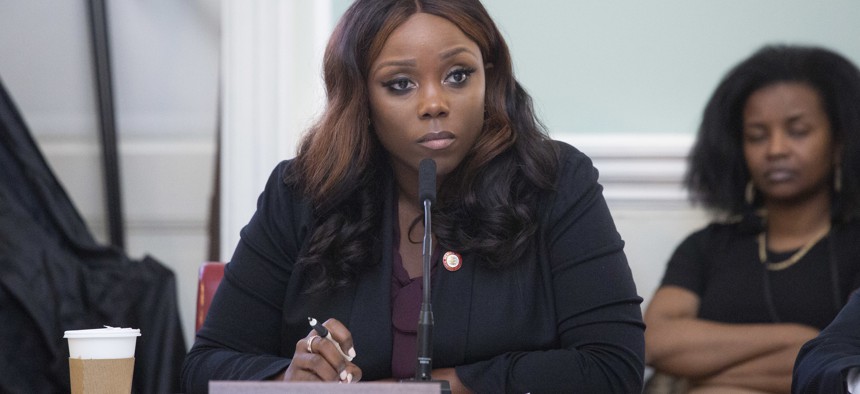Proposal to create an office for nonprofits remains unclear

New York City Councilwoman Farah Louis attends commitee hearing John McCarten/New York City Council
The New York City Council is looking into creating an office to represent nonprofits – but what exactly that means remains unclear.
A bill sponsored by City Councilwoman Farah Louis – the first she has ever introduced – would have the mayor create an office dedicated to nonprofits and he would decide to establish it either in the executive office or a separate one. Its aim would be to serve as a liaison between nonprofits and the city, offering guidance and developing solutions on issues related to contracting, funding opportunities and relevant regulatory information. But the vision for the office’s structure remains vague.
“We’re hoping (the mayor’s office) can take some of our recommendations, as well as the recommendations from the committee, like the finance committee, in order to build it out,” Louis said in an interview. “But we know that a lot of it will come directly from the mayor’s office.”
Jennifer Geiling, executive director of the Nonprofit Resiliency Committee, testified at a City Council hearing on Tuesday in favor of using the proposed office to institutionalize her committee. Created in 2016, the governmental committee brings together more than 100 organizations and city agency representatives to discuss and develop plans to address issues pressing to the human services sector, with a particular focus on government contracts. The group has played a role in pushing for more timely registration of contracts and, most recently, increasing funding for indirect costs of nonprofits contracting with the city.
“We appreciate the flexibility provided by the current draft of the legislation,” Geiling, who also serves as the deputy director for policy and partnerships at the Mayor’s Office of Contract Services. She declined to respond to questions asking if she had a preference for where such an office would be housed.
When asked if the legislation was inspired by the Nonprofit Resiliency Committee, Louis said, “It was something we wanted to before we even came up with the office of nonprofits.” She said she had also developed it in collaboration with other City Council members and staff, along with nonprofits in Brooklyn including Elite Learners and Brooklyn Arts Council.
“Codifying this office means we’re holding the city to the expectation that these services will be offered under a larger, more stable budget for years to come,” said Kristia Winter, communications director for the councilwoman. “Additionally, not every nonprofit in the city is a member of the resiliency committee – this office guarantees access to assistance regardless of organization size or committee membership.”
But some nonprofit organizations expressed reservations about the bill as it exists.
“We don’t quite understand what the details, frankly, of what this proposal is,” Allison Sesso, executive director of the Human Services Council, told NYN Media. “When we read the bill, I think our perspective is we’re not against it but it’s not what we need.” Sesso said that a focus on addressing chronic underfunding of nonprofits is a main priority, referencing recent prevailing wage legislation that nonprofits have criticized as not taking into account their funding challenges. Testimony on the bill from Nonprofit New York and the United Way of New York City also highlighted contracting needing to be essential to the bill.
“We also don’t want the office to give cover to the city for issues like chronic underfunding of contracts,” said Chai Jindasurat, policy director at Nonprofit New York. He recommended that the office, if inspired by the Nonprofit Resiliency Committee, expand its focus from just human services organizations to nonprofits of varying missions.
“I would truly want the office to be sectorwide,” he said.
